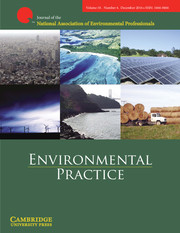The water rich will likely get richer, and the water poor will get poorer. This is the conclusion of an article that I just read about how rising greenhouse gases crank up the water cycle. By measuring ocean salinities, Durack, Wijffels, and Matear (Reference Durack, Wijffels and Matear2012) were able to show that the global water cycle has intensified from 1950 to 2000. In brief, their evidence suggests that a strengthening greenhouse will increase precipitation where it is already high and decrease it where it is already low. A change in freshwater availability in response to climate change is a much greater problem than warming of the temperature. This has obvious implications for the western United States and those transition zones such as the Great Plains, which are mostly too dry already.
For more than 20 years, we have been exposed to claims from opponents of environmental regulation who have been insisting the threats are overblown and that somehow everything would be all right if we did not consider environmental impacts when we make decisions. Perhaps the greatest noise is currently being made by people who claim to be climate skeptics. These people, who are usually not climate scientists, say that scientists are victims of their own groupthink, that temperatures and sea levels are not rising, or that, if they are, it is natural variability. Claims about climate change or climate warming are a plot to force major social changes, they claim.
In some ways, liberals who support taking some action in response to climate change are a victim of our own deeply ingrained sense of fairness and dialogue. Even though 99% of climate scientists agree that global change is real and is occurring, and have done so since 1990 when the Intergovernmental Panel on Climate Change (IPCC) issued its first report, journalists feel obligated to afford equal time to the other side, regardless of its validity. Aside from there often being more than just two sides to every story, the publicity given to the perspective of the 1% versus the 99% distorts the debate and draws attention away from legitimate efforts to question and verify the data and refine conclusions. The effort to question climate science has similarities to efforts to question evolution by creationists, and this perhaps offers some clues about what is going on. It is not by accident that the National Center for Science Education, which has defended the teaching of evolution in schools since 1981, felt it necessary to add defending the teaching of climate science to its mission in 2012. The opposition is based on ideology rather than evidence.
The real skeptics are the scientists, who question results every day and refrain from making exaggerated claims based on limited evidence.
Environmental professionals are familiar with the need to gather evidence and to address scientific uncertainty. Our process is first to identify the relevant environmental resources at a given location and then to project what might happen if a project is developed. With any project, there are great uncertainties on the intensity of impact, and there are almost always problems with defining an impact on a resource within the proper context. Without the proper context, we cannot determine whether an impact is significant and needs to be addressed or is inconsequential and can be considered minor. An inability to deal with scientific uncertainty, common to climate skeptics, evolution skeptics, and environmental science skeptics, leads to paralysis and inhibits environmental decision making.
One approach to deal with uncertainty is to take actions that make sense anyway, even if the skeptics turn out to be right. It probably makes sense to promote energy efficiency, renewable energy, and even nuclear power, for example, because of other fossil fuel impacts to the atmosphere and land than just greenhouse gases. However, the looming possibility of climate change makes the implementation of energy efficiency and renewable energy even more urgent. And if we can't base our decisions on a scientific consensus, we really have no basis to make decisions on anything. We have to make decisions based on the evidence before us. It is for this reason that news stories questioning environmental science should be viewed with real skepticism.


